New Releases
Review: Exodus: Gods and Kings
 Cecil B. DeMille's 1956 epic The Ten Commandments is in no danger of being dethroned by this week's Ridley Scott-directed movie Exodus: Gods and Kings. This film has so many problems, I don't know where to start throwing the blame. Let's call this one (scripted by the brilliant team behind Tower Heist) the worst story that should never be told.
Cecil B. DeMille's 1956 epic The Ten Commandments is in no danger of being dethroned by this week's Ridley Scott-directed movie Exodus: Gods and Kings. This film has so many problems, I don't know where to start throwing the blame. Let's call this one (scripted by the brilliant team behind Tower Heist) the worst story that should never be told.
Perhaps we should start with the whitewashing of its cast. Christian Bale picks up Charlton Heston's sword as Moses, the slave prince. The central conflict is set up between him and Joel Edgerton's Rameses as a prophecy hints the adopted Moses might one day take his place as leader. Joining them are Sigourney Weaver who has no more than two lines as Rameses' mother and John Turturro as the wise old Pharoah Seti. I respect and admire Turturro's acting, but still have to suppress a chuckle that he has gone from playing "The Jesus" in The Big Lebowski to playing the Pharoah here. It is sad though that Turturro among the cast has the most gravitas, given the weight Heston and Yul Brynner previously brought to their roles.
Where Exodus really lost me, however, was not the cast but the script. In spite of the prophecy from the beginning of the film, it attempts to explain away the biblical story as the result of natural phenomena. God appears to Moses in the form of a creepy young boy only he can see as a result of a head injury. The plagues, which are rushed on and off-screen so quickly they hardly register, result from silt caused by the Nile flooding --which kills the fish, drives frogs out of the water, spawns disease. Even the parting of the Red Sea is presented as the result of an unnatural tide that occurs when a comet passes too close overhead. This conceit is a very half-assed attempt to rationalize events, which makes no attempt to explain the final plague.
All are naturally-occurring phenomena, but when presented as such, it takes away the magic and leaves a hollow emptiness where a greater story once stood. Exodus: Gods and Kings looks great with contemporary visual effects, but we're all familiar with the story, and this attempt to reimagine it with the spin of realism does it no favors.
Review: Horrible Bosses 2
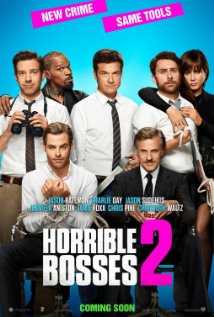 When you have something that really works you don't fuck it up. Horrible Bosses 2 doesn't make the mistake of screwing with the perfectly "horrible" premise of the original movie. Bateman, Day and Sudeikis are an unbeatable comedy team not equalled since Moe, Larry and Curly.
When you have something that really works you don't fuck it up. Horrible Bosses 2 doesn't make the mistake of screwing with the perfectly "horrible" premise of the original movie. Bateman, Day and Sudeikis are an unbeatable comedy team not equalled since Moe, Larry and Curly.
When studios land a hit comedy, the massive return on relatively miniscule investment guarantees a sequel. The Hollywood machine depends on finding a formula that works and milking it dry. Sticking as close to the established formula while changing things up enough to keep it fresh is the magic trick, and sometimes a production team can fail to pull it off. I was worried that would be the case here, that like The Hangover II, the laughs would fall flat for me.
I'm quite happy that my expectations for this film were not met. Director Sean Anders (Sex Drive) shares writing credits with John Morris (Hot Tub Time Machine), Jonathan Goldstein (Horrible Bosses), and John Francis Daley (Horrible Bosses), who's retired from his TV acting gig on Bones (as Dr. Sweets) to pursue writing and directing with a reboot of Vacation coming next year. Returning from the original cast are Jason Bateman, Jason Sudeikis, Charlie Day, Jennifer Aniston, Kevin Spacey, and Jamie Foxx with the pleasant additions of Christoph Waltz and Chris Pine.
The script follows the trio Nick (Bateman), Kurt (Sudeikis), and Dale (Day) as they have quit their jobs and seen their bosses sued, imprisoned or even killed and now set out to be their own bosses in the new company they've formed. Starting a business is a lot tougher than they planned, however, and the trio discovers their own ways to be horrible at being bosses.
As expected, the humor is very R-rated, crass, gross and outrageously funny. Right off the bat the characters find themselves in terribly embarrassing situations, and the tried and true method of "Tell, don't show... then show" works well. Stay at home for your turkey but then head to the theater, because this movie is well done.
Review: The Hunger Games: Mockingjay - Part 1
 The movie The Hunger Games: Mockingjay - Part 1 continues the series, taking it into darker, more adult territory. Fans of the books will not be disappointed. The third film sticks quite close to the events of the Suzanne Collins novel's first half, though the movie is slightly less bloody. Directed by Catching Fire's Francis Lawrence (I Am Legend, Constantine), Mockingjay is both faithful to the source and also timely commentary on the use of media to influence a revolution.
The movie The Hunger Games: Mockingjay - Part 1 continues the series, taking it into darker, more adult territory. Fans of the books will not be disappointed. The third film sticks quite close to the events of the Suzanne Collins novel's first half, though the movie is slightly less bloody. Directed by Catching Fire's Francis Lawrence (I Am Legend, Constantine), Mockingjay is both faithful to the source and also timely commentary on the use of media to influence a revolution.
Peter Craig and Danny Strong penned the screenplay, which picks up immediately after the events in Catching Fire. Katniss (Jennifer Lawrence) has been evacuated to the lost District 13, hidden in a vast complex of underground bunkers. As the clampdown by the government of evil President Snow (Donald Sutherland) on the rebelling districts continues, her best option to contribute to the revolution is to assume the role for which she has unwittingly been groomed and become the Mockingjay, an inspiration and example to the repressed peoples of Panem broadcast in propaganda videos over hijacked airwaves to all the districts. At the same time, her love and fellow Hunger Games champion Peeta is trapped in the Capital, used as an opposing figure begging for an end to violence in official broadcasts.
Until now, the series has always been told first-person from Katniss' perspective. For the first time here, we see just a few scenes with other characters: President Snow and his staff, District 13 President Coin (Julianne Moore) and Game Master Plutarch Heavensbee (Philip Seymour Hoffman) that set up the film as more of a direct conflict between Katniss and Snow. "Moves and counter-moves," muses Snow at one point, to emphasize that this is a chess match between the two, himself in white and Katniss in black. Caught up in the conflict between them, the districts are all in gray, and the grayest among them is 13.
Review: The Theory of Everything
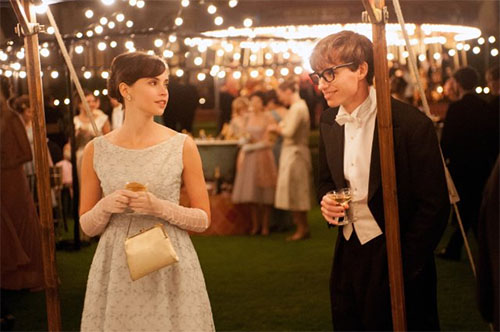
There is surprisingly little science in The Theory of Everything, a film about famed astrophysicist Stephen Hawking's personal life. There is, however, a lot of kissing.
Well, maybe not that much kissing -- at least compared to other romantic films -- but the movie contains far more romance than science. Want to learn about Hawking's groundbreaking work? Skip the deceptively titled The Theory of Everything, which focuses on Hawking's relationship with his first wife, Jane Hawking, and barely touches on his brilliant scientific ideas.
Based on Jane Hawking's memoir Travelling to Infinity: My Life with Stephen, The Theory of Everything opens as grad students Stephen (Eddie Redmayne) and Jane (Felicity Jones) begin dating at the University of Cambridge in 1963. All is well with their courtship at first. But within a few months, Stephen is diagnosed with amyotrophic lateral sclerosis (ALS, also known as Lou Gehrig's disease), a progressive disorder that causes motor neuron degeneration and muscle weakness and atrophy.
Review: Rosewater
 When you browse to the CNN website, you can choose between US and international editions of the site. While both feature current news items, one edition is focused more heavily on stories about celebrity gossip, xenophobic fears and sports. The other focuses on stories about foreign politics, military activities and human-rights figures. I probably don't have to tell you which is which. The fact is, a majority of Americams don't care about what is happening in other countries. If they did, those stories would be the ones featured in the US edition of CNN, and you would already know the story of Maziar Bahari, the Iranian Canadian journalist imprisoned by the Iranian government for 118 days in 2009 accused of being a spy.
When you browse to the CNN website, you can choose between US and international editions of the site. While both feature current news items, one edition is focused more heavily on stories about celebrity gossip, xenophobic fears and sports. The other focuses on stories about foreign politics, military activities and human-rights figures. I probably don't have to tell you which is which. The fact is, a majority of Americams don't care about what is happening in other countries. If they did, those stories would be the ones featured in the US edition of CNN, and you would already know the story of Maziar Bahari, the Iranian Canadian journalist imprisoned by the Iranian government for 118 days in 2009 accused of being a spy.
If you have the slightest interest about happenings outside the US, especially in the Middle East -- an area typically ignored and/or misrepresented by most public education here -- you should consider Rosewater essential viewing. Jon Stewart, comedian, actor and host of the perennially popular The Daily Show, has brought Bahari's tale to the big screen after numerous appearances on his program, one of which figured heavily in his incarceration; the Islamic Republic used as evidence against him an appearance in which Jason Jones appeared dressed as a "spy" for comedic effect.
The import of this movie lies in its ability to help bridge the gaps in understanding that result from the holes in our knowledge and direct experience with Iranian culture. Stewart is new to filmmaking, and at times the feature looks more like a TV program than a film. Much of this is owing to the use of footage from various sources, news clips, even footage shot by friends of Bahari in Iran itself. Stewart edits it into a cohesive experience, but the mood shifts irregularly -- it shifts from documentary to drama and even to comedy. Throughout, however, runs a clear message: Governments control their citizens through information, and with the free flow of communication people can overcome an oppressive regime.
Rosewater's first act puts into perspective some things we take for granted. We have unlimited access to information, news, and culture unfettered by government interference, if we only seek it out. Gael Garcia Bernal as Bahari encounters an educated group of youths operating a "satellite university" where through illegal hidden satellite dishes, they access the world outside Iran's state-controlled media. As Bahari documents the 2009 election, voters swarm the polls, knowing little about the opposition candidate they support ... other than they'll vote for anyone who isn't Ahmadinejad. Before the polls are even closed, state-run media announce an overwhelming majority of the vote for Ahmadinejad in the rigged election. Bahari's mother Moloojoon (Shohreh Aghdashloo) represents the typical voter, unhappy with the Islamic regime but confused by the rampant propaganda on her TV. Meanwhile, rioting breaks out in the streets, and Bahari captures the violence on camera as guards begin firing on civilians, a video that results in his arrest.
Review: Force Majeure
 When faced with starvation, some animals eat their young. When facing death, the wisdom goes, nature rewards parents who protect themselves at the expense of their children as, after all, they can always have more children if they survive. There is also a theory that in times of great stress and danger, instinct can take over our actions and override the conscious brain. This week's release at the Arbor, Force Majeure, explores both of these.
When faced with starvation, some animals eat their young. When facing death, the wisdom goes, nature rewards parents who protect themselves at the expense of their children as, after all, they can always have more children if they survive. There is also a theory that in times of great stress and danger, instinct can take over our actions and override the conscious brain. This week's release at the Arbor, Force Majeure, explores both of these.
Written and directed by Ruben Östlund, the Swedish submission for Best Foreign Language Film in the next Academy Awards won a jury prize at Cannes and audience praise at Fantastic Fest. Peppered with humor at times so subtle I felt it got lost within the drama, Force Majeure reminded me in some way of Escape From Tomorrow. Both films find dark humor with a family of four on holiday when things begin to go nightmarishly wrong.
In this case, that scenario takes the form of a controlled avalanche that proves a little more energetic than expected, threatening the lives of Tomas (Johannes Kuhnke), Ebba (Lisa Loven Kongsli) and their children Vera and Harry (siblings Clara and Vincent Wettergren) as they lunch during their ski trip in the French Alps.
Instead of protecting his family or helping get his children out of the situation, Tomas flees the actually harmless snowdrift. Ebba, shocked by the revelation her husband has failed in a moment of weakness to live up to his role as protector, begins to question their marriage. The children are helpless in the face of the very real possibility that their parents may break up the family as their mother obsesses over an action their father patently denies.
Review: Big Hero 6
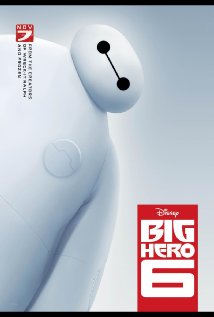 The Walt Disney Animation Studios team continues to knock hits out of the park, following up Wreck-It Ralph and Frozen with this weekend's adaptation of the Marvel comic Big Hero 6. Directed by Don Hall and Chris Williams (Bolt), Big Hero 6 is perhaps a first in presenting modern Asian-American leads as positive role models in a major Hollywood studio production for children.
The Walt Disney Animation Studios team continues to knock hits out of the park, following up Wreck-It Ralph and Frozen with this weekend's adaptation of the Marvel comic Big Hero 6. Directed by Don Hall and Chris Williams (Bolt), Big Hero 6 is perhaps a first in presenting modern Asian-American leads as positive role models in a major Hollywood studio production for children.
Young Hiro Hamada (Ryan Potter) is something of a robotics savant, hustling cash in the underground world of robot fighting a la Real Steel. He's encouraged by older brother Tadashi (Daniel Henney) to apply himself and join him in the advanced robotics program led by Roberto Callaghan (James Cromwell). There he meets fellow students Go Go (Jamie Chung), Wasabi (Damon Wayans Jr), Honey Lemon (Genesis Rodriguez), and Fred (TJ Miller).
An unexpected disaster leaves Hiro reeling, and with the help of his friends and Baymax (Scott Adsit), his brother's helpful medical robot, Hiro transforms the group into superheroes in order to fight the evil threatening their city of San Fransokyo.
The screenplay by Jordan Roberts, Robert L Baird and Daniel Gerson is fun for kids, presenting science as a cool way to create fun things. It also treads into some darker subject matter, including how to responsibly deal with grief. Nevertheless, Big Hero 6 is clever and funny with entertaining characters (though fans of the comic will note some changes due to the rights to two characters being owned by 20th Century Fox).
Each character in Big Hero 6 has unique and useful powers fitting their personalities and skills, and everyone is sure to choose a favorite. (Mine was TJ Miller-voiced Fred, who loves to pretend he is a kaiju and gets many of the funniest lines as they are improvised by the actor-comedian.) "Come early, stay late," is the rule for this so that you won't miss the absolutely brilliant short Feast playing along with it or the hilarious post-credits stinger.
Review: Interstellar
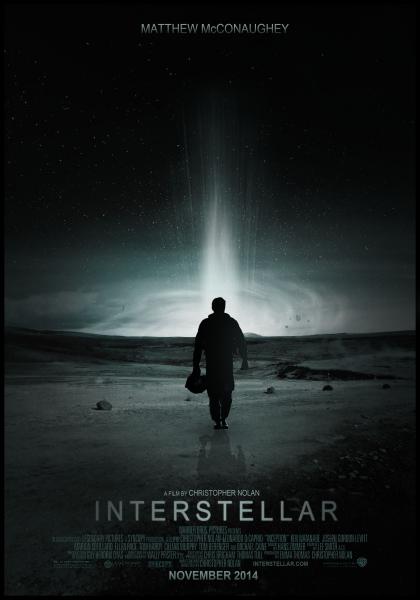 Take the theory of relativity, theories about space and time, and quantum physics; combine them with intense emotions and exploration of relationships, both personal and familial; write a 169-page screenplay about it all, then bring said screenplay to life. While this task sounds like something way over my film-school brain, Christopher Nolan makes it seem easy as cake with his latest movie, Interstellar.
Take the theory of relativity, theories about space and time, and quantum physics; combine them with intense emotions and exploration of relationships, both personal and familial; write a 169-page screenplay about it all, then bring said screenplay to life. While this task sounds like something way over my film-school brain, Christopher Nolan makes it seem easy as cake with his latest movie, Interstellar.
I've watched many a film buff get into heated debates about Nolan's work. There are those who argue his work is flashy, dazzling you with inexplicable knowledge and plot while melting your eyeballs with IMAX cinematography. On the other hand, there are those who argue his work is brilliant, each camera move and plot point an intricate dance filled with depth and emotion. I tend to fall into the middle of this arguement.
The basic premise is this: Cooper (played by Texas favorite, Matthew McConaughey) is a former-engineer-turned-farmer living with his young daugher Murphy and teenage son Tom. We understand right away that Earth is in trouble: All its resources have been utilized and the world is running out of time to find food and water. By some happenstance of the universe, Cooper finds his way over to a secret NASA location, learning about a secret mission to find another planet for humans to live on ... and of course, Cooper is the only man to pilot said ship to save the human race.
While there is no doubt that Nolan's work is (inter)stellar, it can definitely be cumbersome. I found myself losing focus toward the middle of Interstellar, unsure of what the end result of this 169-minute saga would be. Thankfully, the story reeled back around and left for a compelling (and quite thought-provoking) third act.
One of the few downsides to the movie was the scientific jargon thrown around between characters. Poor line delivery made me wonder (in just a few instances) what the final theory actually was. This film also features a fun game of "Guess how many Hollywood celebs you can spot in space!"
Review: Nightcrawler
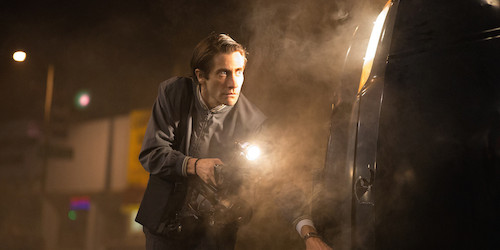
Over the last several years Dan Gilroy has made a name for himself in Hollywood as a screenwriter. After a few misses, he struck gold with The Bourne Legacy, a script that really put him on the map and ended up giving him the power to jump behind the camera. His directorial debut, Nightcrawler, is a slick thriller, even though it plays out like a gritty b-movie. Robert Elswit, Paul Thomas Anderson's frequent cinematographer, captures the streets and vistas of Los Angeles in an alluringly dangerous way instantly during the opening credits.
We're seduced by the city and then introduced to Lou Bloom (Jake Gyllenhaal), a man who seems to have at least some level of Asperger's syndrome (or, at bare minimum, is not good at communicating with other people). We cannot really discern much about his life initially. Living in a small apartment and seemingly without a job, he drives around the city late at night looking for things he can steal and sell for scrap money. On the expressway, he comes across an accident site right as the police are beginning to assist. He gets out of his car and is transfixed by the scene, even more so when a fast moving van pulls up alongside him and runs toward the cops with video cameras in their hands, capturing the accident which has now turned into a dramatic police rescue before the car engulfs in flames.
Movies This Week: October 31-November 6, 2014

The Austin Film Society's "Art Horror" series is wrapping up appropriately here over Halloween weekend with Hausu, a 1977 Japanese horror film directed by Nobuhiko Obayshi. Screening this evening and again on Sunday afternoon in 35mm at the Marchesa, I can guarantee that you've never seen anything like it before. I suspect that this will attract a lot of people who have seen the movie many times before, but catching it on the big screen for the first time is something I can highly recommend. In a much different vein, Philippe Garrel's Jealousy is on the calendar for Sunday and Monday evenings. This new black-and-white French drama stars Philippe's son Louis Garrel. The latest "Essential Cinema" series spotlighting the work of Satyajit Ray comes to a close on Thursday night with 1979's Joi Baba Felunath (The Elephant God).
At the Alamo Drafthouse, John Carpenter's Halloween will screen late tonight at the Lakeline, Slaughter Lane and South Lamar locations. Alamo Ritz has Dark City, one of the finest sci-fi features of the 90s in 35mm on Sunday night, Luc Besson's The Fifth Element on Tuesday night and Clint Eastwood's Bronco Billy in 35mm on Wednesday night. New release Birdman (Mike's review) is also expanding this weekend to add the Lakeline and Slaughter Lane locations (adding to the Alamo South Lamar, Regal Arbor and Violet Crown, where the film continues).
The Alamo Slaughter Lane is having a one-time screening of the extended cut of Michel Gondry's Mood Indigo on Monday evening in advance of the film's release on home video. The international cut of the film was trimmed down to 94 minutes (Elizabeth's review), but this is the full 131-minute version that was screened in France. Both versions will be on the Blu-ray edition, but if you'd like to see it on the big screen, this is your only chance.

